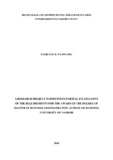| dc.description.abstract | The supermarket sector in Kenya plays an important role as an employer as well as playing an important role in transmission of manufactured goods, both locally produced and imported, to the final consumer. Supermarket factors that influence consumer buying behaviour will be important in increasing the supermarket sales. The objective of the study was to determine the influence of brand image on consumer buying behaviour of supermarkets in Kenya. The independent variables were brand attitude, brand attribute and perceived benefits, while the consumer buying behaviour was taken as the dependent variable. The brand attitude was manifested through the respondents’ perception of the brand quality of products being satisfactory and hence enhancing brand attitude and capacity of the supermarket to provide product appearance and packaging that meet consumers' needs. The ability of the supermarket to offer quality products, social status associated with the supermarket was found to influence the consumer shopping behaviour. The findings indicate that the comfort associated with shopping in a particular supermarket is considered an important feature in choosing where to shop and the luxury of shopping that a supermarket facility offer. Results indicated that there is positive relationship between the brand images on consumers’ buying behaviour as brand attitude, brand attribute and perceive benefits. The model summary of the predictor variables and the buyer shopping indicate that there exist a strong positive correlation between the variables (r = 0.906) while the coefficient of determination measure (R2 = 0.821). This implies that 82.1% of the supermarket shopper buying is influenced by the brand image of the firm. The F-value of 112.997 indicates that the model predictor variables collecting are a good measure of predicting buyer shopping behaviour. From the coefficients, the brand attitude (B=0.760) registered the highest measure implying that the brand attitude had the greatest influence on the shopper buying behaviour. Likewise the perceived benefits (B=0.123) had the minimum influenced on shopper buying behavior. The study concluded that brand attribute and perceive benefits significantly impact on consumers’ buying behaviour of supermarket product brands rather than brand attitude. The study recommended that the supermarket managers should sensitize its employees on the important of developing a positive supermarket brand through service delivery of quality products with long shelf life and develop a state of safe buying environment for consumers. The study recommended that a longitudinal study be undertaken to establish how brand image influence consumer buying behaviour over a period of time. | en_US |



